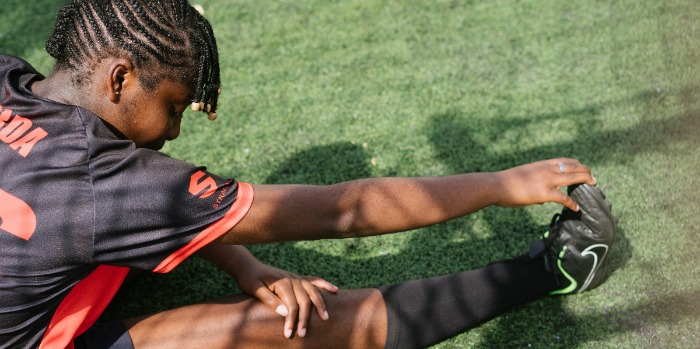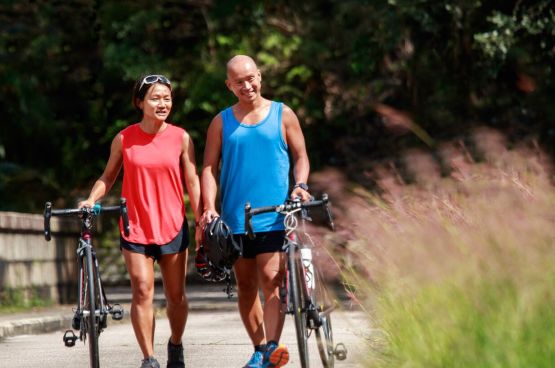How to motivate your teenager to exercise
If you struggle to get your teen away from screens or out of their bedrooms, you’re not alone. But keeping active at this age is more important than ever. Here, I’ll talk about the benefits of exercise for teenagers – and how you can encourage your teen to get moving.

What are the benefits of exercise for teenagers?
Regular exercise is important for everyone – no matter your age. But there are several reasons why it’s particularly important for teenagers.
The teenage years – when you have your biggest growth spurt – is the most important time for muscle and bone-strengthening exercises. These tend to be high-intensity activities that involve weight-bearing or jumping. Building strong muscles and bones at this age can help you reach your full physical capacity and avoid problems later in life.
Being physically active is associated with many health benefits, which will be important to your teen in the long-term. But often the shorter-term gains will be of greatest importance to your teen. These include:
- boosting self-esteem
- reducing stress and improving mental wellbeing
- better sleep
- maintaining a healthy weight
- more social interactions
- improved learning
How much exercise should teenagers do?
UK guidelines recommend that children and people younger than 18 should aim for an average of at least 60 minutes of physical activity each day. This doesn’t all need to be at once, and it can include different types of exercise. The walk to school, kick around in the park, and practising the latest TikTok dance craze all count.
There is a trend for young people to become less active as they get older and go through adolescence. But maintaining an active lifestyle through their teenage years can make you more likely to be active as an adult.
How can I encourage my teen to be more active?
Going in too strong, setting conditions or rules about exercising is likely to just have a negative effect. Exercise has to be something they want to do and makes them feel good – otherwise it’s never going to work. Here are some tips for encouraging your teen.
- Model good habits. Young people are more likely to be active if they see parents exercising, and enjoying it. Try to be more active as a family when you can, and invite your teen to join in with your own exercise sessions. That might include going to the gym, joining you for an evening walk, or following a workout together online.
- Make physical activity a daily part of your routine. If you usually drive your teen to school or friends’ houses, encourage walking all, or part of the way, where possible. Get them helping with active household chores – like mowing the lawn, washing the car, or walking the dog.
- Don’t link exercise to weight and diet. It’s better to keep the two separate. Focus instead on how good exercise makes you feel and the positive effects it can have in getting stronger and fitter.
- Embrace technology. Fitness trackers that monitor activity and count steps may encourage your teen to do more. Fitness apps can help with setting routines and give inspiration for getting started.
- Have a goal. Signing up to an event like a 5K race, Tough Mudder, or online challenges can be a good motivation to keep going. Encourage them to follow a training plan to build up to their final goal. You can do it together – or at least be on the sidelines to cheer them on!
- Join a team or club. Being part of a team or club can trigger a love for a sport that could last well into adulthood. Look out for trial sessions or open days over the summer and at the start of the new school year.
- Harness the power of social media. Encourage your teen to follow positive role models for workout tips and fitness goals. Check the social media accounts your teen follows to make sure they’re promoting positive messages.
Eight exercise ideas for teenagers
If you need ideas for activities for your teen this summer, try some of these eight suggestions.
- Basketball. It can be fun to have a net at home so your teen can practise their skills. But if that’s not an option, you may be able to find one in a nearby park – the perfect excuse to get a group of mates together.
- Skatepark. Whether they’re skateboarding, scooting, or rollerblading, getting your teen down to their local skatepark can make for a fun – and energetic – afternoon out.
- Stand-up paddleboarding (SUP). One of the most popular watersports in recent years. You can find paddleboards for hire and taster sessions on rivers, canals, and coastal areas all over the UK. Paddleboarding is a lot of fun – and getting the technique right can be a full body workout too.
- Cycling. Having a bike can help your teen to be independent. If they’re more of a thrill-seeker, investigate local biking tracks for that extra adrenaline fix.
- Video games. Ideally, it’s better to cut down on screen time altogether. But if that’s a battle, at least try to encourage games that keep you moving. There’s a wide range of sports, virtual reality, and dancing games available – you may even want to join in!
- Yoga. This is a great exercise for improving strength, flexibility, and balance. It’s good for learning some relaxation tips too and can boost mental wellbeing. You can attend a class in person or follow a session online.
- Parkour. A relatively new sport, Parkour incorporates running, jumping, and climbing around various obstacles. If your teen is an adrenaline junkie or just looking for something a bit different, this might do the trick. Parkour facilities are starting to pop up everywhere, even in local parks. You can also encourage your teen to join a group or class .
- Resistance training. Using free weights and machines is an excellent way of building up muscle strength. This is something that teenagers can do more of as they get older – and can lead onto an adult fitness routine.
We now offer GP appointments for children under 18. Find out more about our Under 18 GP Service, call us on 0330 822 3072.
-
Sources Sources
- Muscle and bone strengthening activities for children and young people (5 to 18 years). A rapid evidence review. Public Health England. gov.uk, published January 2021
- Physical activity guidelines: UK Chief Medical Officers' report. gov.uk, published 7 September 2019
- Active lives children and young people survey. Academic year 2021-22. Sport England. sportengland.org, published December 2022
- Children and young people. Working with families. Sport England. sportengland.org, accessed 4 July 2023
- Wyszyńska J, Ring-Dimitriou S, Thivel D, et al. Physical activity in the prevention of childhood obesity: the position of the European Childhood Obesity Group and the European Academy of Pediatrics. Front Pediatr 2020;8: 535705. doi: 10.3389/fped.2020.535705
About our health information
At Bupa we produce a wealth of free health information for you and your family. This is because we believe that trustworthy information is essential in helping you make better decisions about your health and wellbeing.
Our information has been awarded the PIF TICK for trustworthy health information. It also follows the principles of the The Information Standard.

More exercise and fitness articles
Did you find our advice helpful?
We’d love to hear what you think. Our short survey takes just a few minutes to complete and helps us to keep improving our healthy lifestyle articles.
Legal disclaimer
This information was published by Bupa's Health Content Team and is based on reputable sources of medical evidence. It has been reviewed by appropriate medical or clinical professionals and deemed accurate on the date of review. Photos are only for illustrative purposes and do not reflect every presentation of a condition.
Any information about a treatment or procedure is generic, and does not necessarily describe that treatment or procedure as delivered by Bupa or its associated providers.
The information contained on this page and in any third party websites referred to on this page is not intended nor implied to be a substitute for professional medical advice nor is it intended to be for medical diagnosis or treatment. Third party websites are not owned or controlled by Bupa and any individual may be able to access and post messages on them. Bupa is not responsible for the content or availability of these third party websites. We do not accept advertising on this page.







